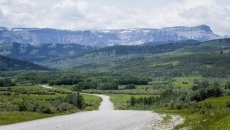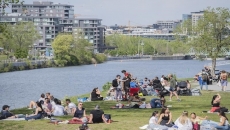A new report released from Canada's parliamentary budget officer Wednesday says the speed at which change needs to happen for how people drive and heat buildings will make it tough for the Liberal government to achieve its latest climate goal.
Prime Minister Justin Trudeau promised in April that Canada would slash greenhouse gas emissions by 40 to 45 per cent below 2005 levels by 2030.
Canada is currently signed on to an international agreement to slash this heat-trapping pollution by 30 per cent for that year, but joined other nations in ratcheting up its target to boost global efforts to fight climate change.
The Liberal government says existing measures like its carbon pricing regime put Canada on track to slash greenhouse gas emissions by 36 per cent by 2030 — and has yet to detail how it will close the remaining gap.
The parliamentary budget officer studied the government's higher targets and says while the technology exists to reduce these emissions, "the scale and speed of the changes will make it challenging to achieve."
The report gives examples in sectors such as transportation as well as in oil and gas.
It estimates that given how Canada's current stock of cars and light truck sits at around 23 million, to help further reduce emissions to meet the revised target, around half of new vehicle sales in Canada starting next year would have to be for ones powered by zero-emission technology.
"Only a prohibitively high subsidy could achieve that objective," the PBO report reads.
It added that heating buildings using less carbon-intensive methods and further reducing emissions in the oilsands would require new technologies to be deployed quickly, with the right infrastructure having to be in place.
As an example, the report mentions putting more electric vehicles on the roads means they have to be supported by the proper electrical generation capacity to provide the necessary power.
The report also analyzed how the Liberals' rising carbon price will potentially affect the economy.
Last December, the government confirmed its carbon price would steadily rise from $50 per tonne in 2022 to reach $170 per tonne in 2030.
The move was panned by many in Western Canada's oil and gas industries as well as the Opposition Conservatives that say the fuel costs unfairly burdens Canadians who have no choice but to drive, and the policy undermines the country's competitiveness given not every country uses carbon pricing.
The PBO report says increasing the carbon price to $170 per tonne by 2030, combined with other climate polices, will negatively impact real GDP by 1.4 per cent.
It presents the figure with two caveats: That is doesn't know whether the deployment of new technologies will lead to gains in terms of productivity, and can't say what climate change itself will cost Canada.
The report also says the hits to real labour incomes will be felt mostly in the fields of oil and gas and transportation, with workers who have lower education levels feeling losses more so than those with higher education.






